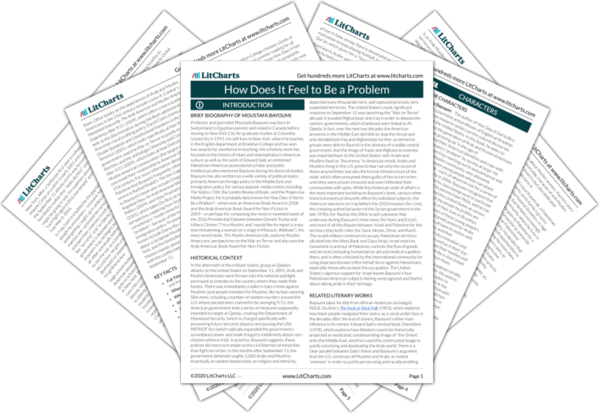Racism, Discrimination, and Foreign Policy
Moustafa Bayoumi takes the title of How Does It Feel to Be a Problem? from the seminal African-American sociologist W.E.B. DuBois, who asked the same question of black America at the beginning of the 20th century. After September 11, Bayoumi suggests, Arabs and Muslims have become the new “problem” group in the United States: they are treated as second-class citizens as a result of developments in U.S. foreign policy that conflate terrorist groups…
read analysis of Racism, Discrimination, and Foreign PolicyArab American Identities
Bayoumi emphasizes and attempts to circumvent the dangerous American assumption that all Arabs and Muslims are somehow the same. His subjects come from a variety of national backgrounds and identify to varying degrees with their nations; the label “Arab” does not fully capture any of their identities any more than the label “American” does. Ultimately, Bayoumi shows not only how the youths he profiles actively define their identities in complex ways, only some of which…
read analysis of Arab American IdentitiesFaith, Tradition, and Islam
Islam plays widely different roles in the lives of the seven people Bayoumi interviews, but all of them (including Sami, who is Christian) nevertheless grapple with their relationship to it. They struggle to bridge their personal knowledge of Islam with the negative representations of it that dominate American discourse, and one of Bayoumi’s central motives is to dispel the assumptions that make up these negative representations: that Muslims are usually devout, conservative, and fundamentalist…
read analysis of Faith, Tradition, and Islam
Growing Up and Self-Discovery
While the seven individuals at the center of Bayoumi’s book all face discrimination based on their Arab and Muslim identities, they are also just young adults trying, like people of their age everywhere, to determine who they are, what matters to them, and what they want to do with their lives. Most graduate from the confusion of adolescence, often exacerbated by 9/11, to the provisional certainty of young adulthood. All affirm their cultural…
read analysis of Growing Up and Self-DiscoveryJustice, Activism, and the Future of American Democracy
Bayoumi’s subjects stand at a crucial juncture not only in their lives, but also American history: they are living through a radical change in American institutional and popular attitudes toward Arabs and Muslims, and they face the burden of defining the future of Arab and Muslim America—and, to an extent, the United States as a whole. They all recognize not only the United States’ parallel histories of racial persecution and acceptance of outsiders, but…
read analysis of Justice, Activism, and the Future of American Democracy






